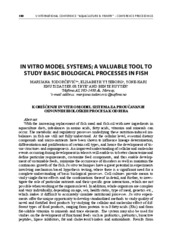In Vitro Model Systems; A Valuable Tool To Study Basic Biological Processes In Fish
Korišćenje in vitro model sistema za proučavanje osnovnih bioloških procesa kod riba
| dc.contributor.author | Todorcevic, Marijana | |
| dc.contributor.author | Ytteborg, Elisabeth | |
| dc.contributor.author | Knutsdatter Ostbye, Tone-Kari | |
| dc.contributor.author | Ruyter, Bente | |
| dc.date.accessioned | 2015-10-11T17:00:49Z | |
| dc.date.available | 2015-10-11T17:00:49Z | |
| dc.identifier.uri | http://arhiva.nara.ac.rs/handle/123456789/957 | |
| dc.description.abstract | With the increasing replacement of fish meal and fish oil with new ingredients in aquaculture diets, imbalances in amino acids, fatty acids, vitamins and minerals can occur. The metabolic and regulatory processes underlying these nutrition-induced imbalances in fish are still not fully understood. At the cellular level, essential dietary compounds and micro-nutrients have been shown to influence lineage determination, differentiation and proliferation of certain cell types, and hence the development of tissue structures and organogenesis. An improved understanding of cellular and molecular events occurring during development in teleosts will enable us to better characterize and define particular requirements, customize feed components, and thus enable development of sustainable feeds, minimize the occurrence of disorders as well as maintain the continuous growth of the fish. In vitro techniques have a great potential in experiments involving mechanism based hypothesis testing, where there is a significant need for a complete understanding of basic biological processes. Cell cultures provide means to study single-factor effects and the combinations thereof in detail, and further, to investigate the role of particular nutrients and their specific gene interactions, which are not possible when working at the organism level. In addition, whole organisms are complex and vary individually, depending on age, sex, health status, type of meal, genetics etc., which makes it difficult to accurately simulate nutritional processes. In vitro experiments offer the unique opportunity to develop standardized methods to study quality of novel and fortified feed products by studying the cellular and molecular effect of different types of food products, ranging from proteins to n-3 fatty acids (FAs) and from fat-soluble vitamins to minerals and trace elements. The system may also be used for studies on the development of functional feeds such as probiotics, prebiotics, bioactive peptides, lipase inhibitors, fat and cholesterol binders and antioxidants. Results from selected in vitro trials, showing how different nutrients may influence development of fat, bone and muscle cells and lipid metabolism in liver cells, will be presented. | en |
| dc.description.abstract | Zamena ribljeg brašna i ulja sa novim, alternativnim izvorima proteina i masti u hrani za ribe može dovesti do narušavanja odnosa amino kiselina, masnih kiselina i minerala kod ovih organizama. Promene u metaboličkim i regulatornim procesima koje mogu da nastanu loše balansiranom ishranom još uvek nisu dobro proučene kod riba. Esencijalne hranljive materije i mikronutrijenti mogu da utiču na razvoj pojedinih ćelijskih linija, njihovu proliferaciju, a samim tim i na pravilan razvoj tkiva i organa. Bolje razumevanje ćelijskih i molekularnih procesa, koji se dešavaju tokom razvića košljoriba će nam omogućiti da bolje razumemo i definišemo određene zahteve za ishranom na svakom stupnju razvoja riba, prilagodimo komponente riblje hrane, a samim tim i omogućimo normalan razvoj i rast riba, kao i da sprečimo pojavu različitih poremećaja. Korišćenje in vitro sistema predstavlja veliki potencijal za testiranje novih komponenata hrane i daje nam mogućnost za razumevanje osnovnih bioloških procesa kod riba. Prednost korišćenja ćelijskih kultura je što nam one omogućavaju da proučavamo uticaj pojedinačnih faktora, ali i kombinaciju dva ili više različitih faktora i njihov uticaj na gene, što nije moguće istraživati na nivou organizma. Pored toga proučavanje organizma kao celine je jako složeno, jer zavisi od pola, zdravstvenog stanja jedinke, ishrane, genetike, itd., te je na ovaj način lakše simulirati procese ishrane. In vitro eksperimenti nude jedinstvenu priliku da razvijemo standardizovane metode za proučavanje kvaliteta i efekata novih hranljivih materija: od proteina, preko masnih kiselina i minerala, do elemenata, koji se u hrani nalaze u tragovima. Ovi sistemi mogu se koristiti i za proučavanje novih, funkcionalnih hraniva, kao što su: probiotici, prebiotici, bioaktivni peptidi, masti, inhibitori lipaze, antioksidansi. Biće prikazani rezultati odabranih in vitro ispitivanja uticaja različitih hraniva na metabolizam masnog tkiva, kostiju i mišića kao i na sam metabolizam masti. | sr |
| dc.subject | fish | en |
| dc.subject | development | en |
| dc.subject | cell culture | en |
| dc.subject | nutrients | en |
| dc.subject | riba | sr |
| dc.subject | razvoj | sr |
| dc.subject | ćelijska kultura | sr |
| dc.subject | hranljive materije | sr |
| dc.title | In Vitro Model Systems; A Valuable Tool To Study Basic Biological Processes In Fish | en |
| dc.title.alternative | Korišćenje in vitro model sistema za proučavanje osnovnih bioloških procesa kod riba | sr |
Files in this item
This item appears in the following Collection(s)
-
5. International Conference “Aquaculture & Fishery” Faculty of Agriculture, Belgrade-Zemun, Serbia, June, 1 - 3. 2011.
http://www.cefah.agrif.bg.ac.rs/konferencija/konferencija.html



